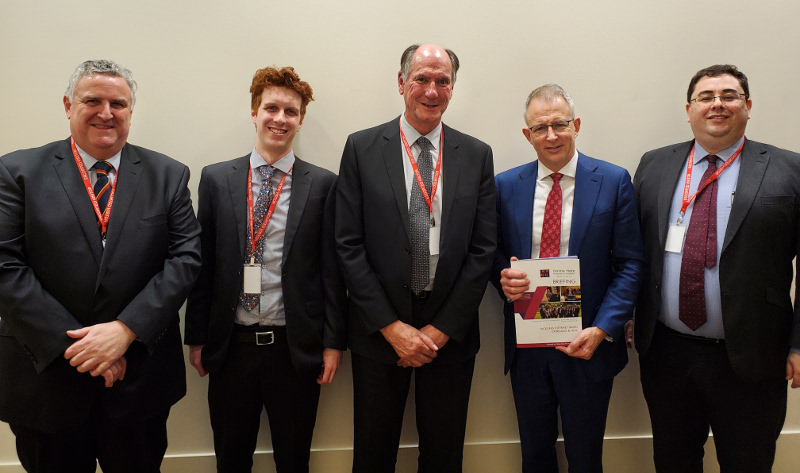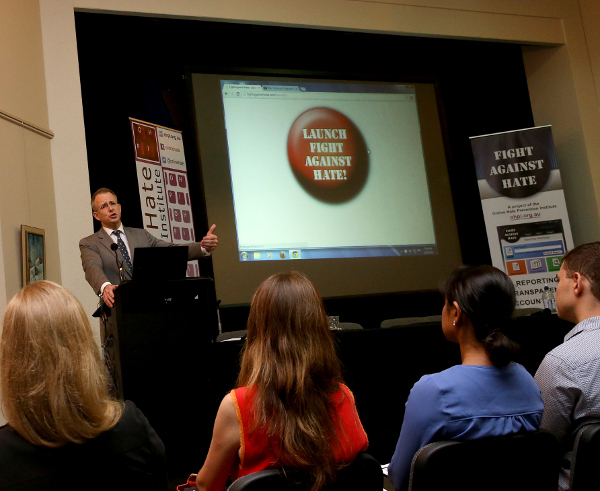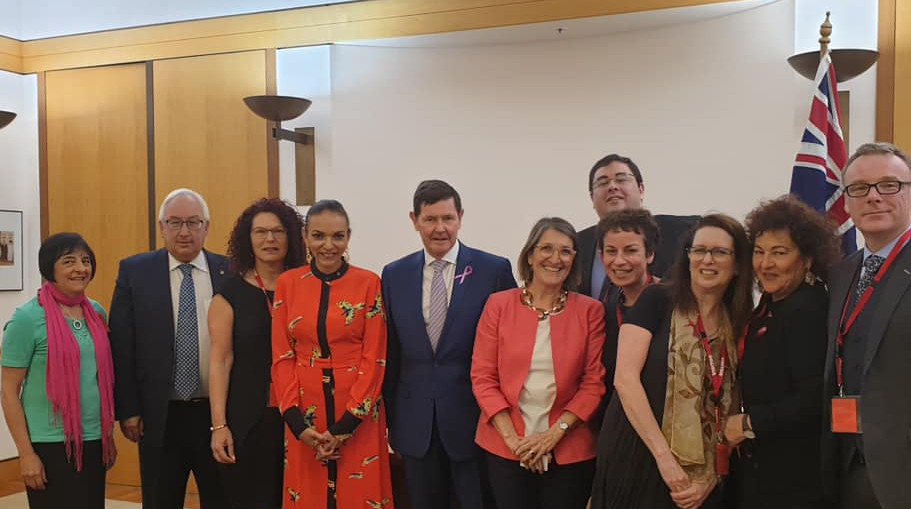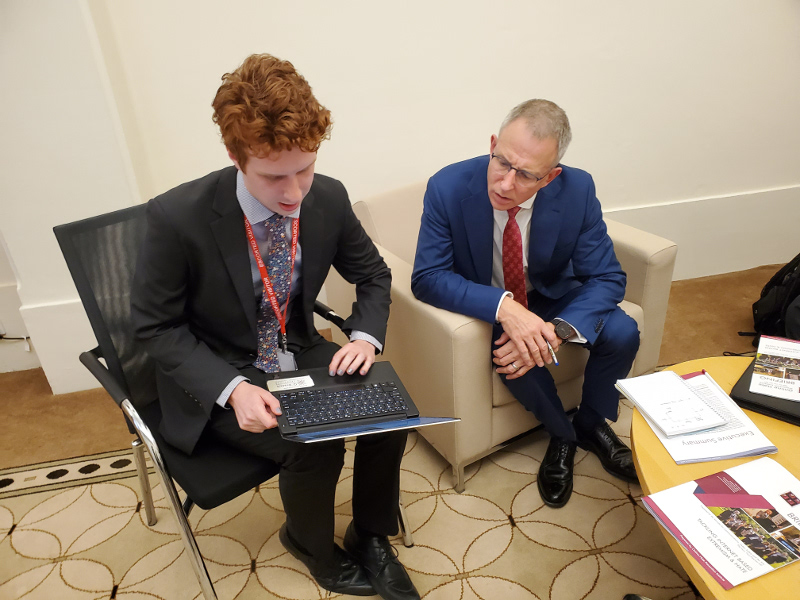
On Friday the Online Hate Prevention Institute met with the Hon. Paul Fletcher MP, Federal Minister for Communications, Cyber Safety and the Arts. In the meeting we briefed the Minister on the recent work of the Online Hate Prevention Institute, particularly in the area of Cyber Safety.
Contributing to a safer online world
Our discussion was aided by a 36 page written briefing our team prepared. The document highlighted OHPI’s contribution to combating violent extremism including:
- The removal of two terrorist manifestos which has been promoted by an attacker through 8Chan
- Monitoring of incitement to violence, terrorist attacks and riots in far-right spaces on social media following major incidents
- Work with social media platforms and police in response to profiles and pages promoting violence and posing a potential threat
We also discussed our work to empower communities and build resilience with technology, training and support. The expertise of our staff and volunteers who operate across disciplines brings together deep technical, legal and content based expertise. Our insights are driven by the data we gather and our Fight Against Hate reporting tool, which Mr Fletcher was kind enough to launched for us back in December 2014, gives us a real edge.

Our Innovation and Impact
We briefed the Minister on the impact of the system since he launched it. That includes powering empirical research that brings transparency to social media. This work has resulted in reports examining the volume and nature of hate speech in social media. In our briefing we focused particularly on hate speech which incites violence.
- Our report for the Global Forum to Combat Antisemitism demonstrated that 5% of the reported antisemitism related to incitement to violence. The same report showed serious shortcomings in the ways platforms responses with only 14% of the incitement on Twitter being removed after 10 months (and after Twitter had been given the set of data). We explained how thankfully this situation has since improved with Twitter changing its policies.
- Our Interim report into online Islamophobia demonstrated that 9% of the reported anti-Muslim hate related to incitement to violence. The report has been cited by both the United Nations Human Rights Council and the Australian Human Rights Commission.
- We also discussed the potential for our tools to be used to protect public safety, particularly during times of crisis. We shared some of the ideas we first put forward at the Asia Pacific launch of Tech Against Terrorism.
- We shared how the tool is currently powering an Australian Government pilot project gathering reports on antisemitism and Holocaust denial as part of a multilateral effort with Italy and Luxembourg. The project, led by OHPI, is part of Australia’s support for the International Holocaust Remembrance Alliance. Earlier this year we briefed the Human Rights Sub-Committee in Parliament on Australia’s work with IHRA, including this project.
- Further international collaborations, particularly in the Asia-Pacific region, are also being discussed with overseas partners.

UNESCO praised the innovative nature of the original reporting tool in a number of reports and also verbally when we presented it at the United Nations in New York. Since then the reporting tool has been completely redeveloped.
The new version of the tool can operate in multiple languages, it can run as a widget on the websites of other organisations, and it can be configured for each organisation that wishes to use it. This allows us to shift our focus so greater emphasis can be placed on empowering and supporting other organisations in the community. We have carried out research into the benefits of this for both community resilience and global cooperation to tackle online threats. We have also added a powerful analysis tool (still in development) to work with the resulting data, based on consultations with police, human rights organisations and community organisations.

Engaging with tomorrow’s leaders
The new software development is possible thanks to the support of numerous teams of final year software engineering students from Monash University. We have had 5 teams comprising a total of 23 people, each contributing a significant effort over the better part of a year. This is in addition to our own staff who have been working on this cutting edge technology since we were founded in January 2012. Between paid time and the contribution of the students, millions of dollars worth of effort have been invested into refining our cutting edge technology.
Representing the current team of student developers, Jarred Gallina demonstrated the latest version of Fight Against Hate to the Minister. Features added by the current team include recreating the reviewing system for use in the new system and developing a framework using artificial intelligence to detect attempted abuse of the reporting system.

We’ve also had multiple student teams from La Trobe University, primarily in strategic communications, assist with campaigns and the development of training and educational resources. The student have been collaborating across disciplines and universities as they support OHPI’s work.
We also shared with the Minister how after the Christchurch attack, Cyber Security and Computer Science students from La Trobe gathered for a crash course we delivered in social media digital forensics. After this they spent an afternoon finding and collating data on dangerous material. This gave a major boost to our less public work supporting police, government departments and agencies as well as directly working with social media platforms to rapidly address online threats. We shared a little of this experience with the Minister.
The work of OHPI has been used across law, criminology, cyber security and strategic communications subjects at La Trobe University. It gives students real world examples of threats to online safety and the opportunities to consider new responses whether through law reform, technical improvements, policy responses or communications strategies.
Looking to the future we mentioned an ARC grant application with Deakin University which we hope to soon hear back on. The project will look at advanced artificial intelligence to tackle online hate and bench-marking for different approaches.
A Strategic Partnership
The Online Hate Prevention Institute has provided a significant service to the online safety of Australians since January 2012. The Christchurch Call recognises the role civil society organisations like ours can play in tackling extremism and contains a commitment from both government and industry to supported that work. None of us can do this alone. Government, the technology sector and civil society need to work together. To do that, civil society needs to be supported.
We have a strong track record of providing valuable services and support to the government to keep Australia safe. We have continued to do so since our seed funding from private donors ended a few years ago. Our operations have, however, been scaled back significantly due to a lack of resources, just at the time online extremism has been growing.
We suggested to the Minister that the time is right for a strategic partnership between the Online Hate Prevention Institute and the Australian Government. Such partnerships exist with leading charities in a range of other areas of public concern. Such a partnership would allow the Online Hate Prevention Institute to increase its collaboration and support for government departments and agencies. It would allow us to return to full capacity so we can better support the Australian public. This was only an initial meeting, but we hope to continue the discussion and to work with the government to improve online safety and make Australia a leading example of effective responses to online extremism which are consistent with human rights. Together we can do this.
Comments and Support
You can comment on this report of our meeting on this Facebook post. We particularly welcome comments from our long time supports on the idea of a partnership with government.
The post also has a donate button for those able to support our work. Donations of any size are welcome and given the small size of our budget they do make a real difference to us. There are also other ways to donate.
The meeting and the preparation for it was a great opportunity to reflect on our work over the last few years and the amazing impact we have made thanks to your support. From everyone involved in the Online Hate Prevention Institute, thank you!
